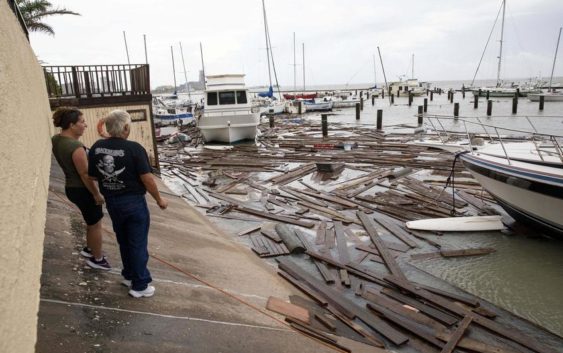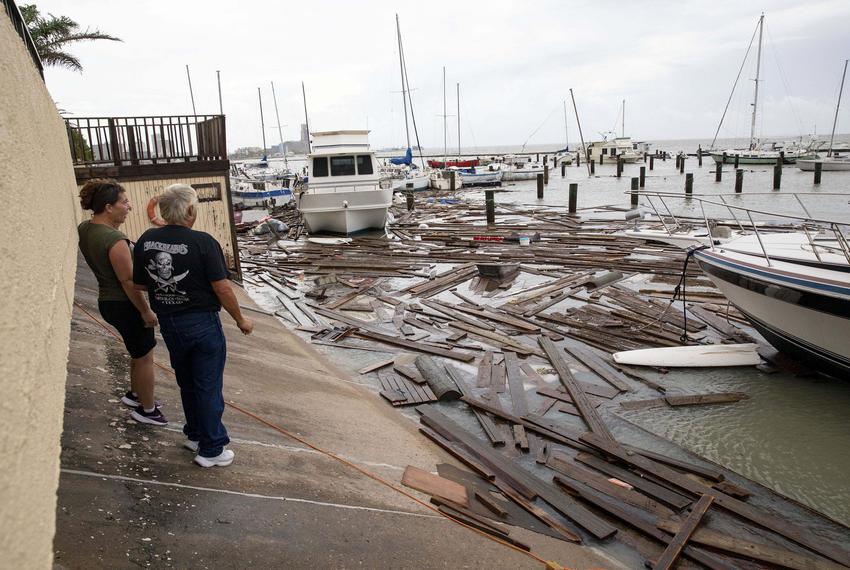- McDowell County wildfire spreads to 500 acres, evacuation orders in place
- Evacuations in Caldwell County due to wildfire
- Northwest Houston 'ghost neighborhood' caused by repeated flooding to become latest detention basin
- NHL playoffs: Hurricanes open playoffs Easter Sunday afternoon vs. Devils
- 2 wildfires spreading in rugged terrain in western North Carolina
Thousands of Texans remain without power in the aftermath of Hurricane Hanna

Two days after Hurricane Hanna touched down in South Texas, thousands remained without power and communities were grappling with how to deal with the damage caused by flooding and strong winds.
The storm, which made landfall as a Category 1 hurricane Saturday evening at Padre Island, packed sustained winds as high as 90 mph before weakening into a tropical storm early Sunday and moving into northern Mexico. It was the first hurricane of the 2020 Atlantic hurricane season.
Hanna unleashed more than 15 inches of rain in parts of South Texas, resulting in serious flash flooding, according to The Washington Post.
Gov. Greg Abbott warned Texans on Sunday that there are continued threats of flash flooding even as rainfall slows, due to overflowing rivers.
“Any additional rainfall will exacerbate these threats, but the State of Texas is ready to respond and protect our fellow Texans,” he said in a statement.
The Federal Emergency Management Agency and President Donald Trump approved a federal emergency declaration in response to Hanna, allowing for some federal assistance and reimbursement for evacuation efforts and shelter support. Abbott previously issued a disaster declaration for 32 counties.
Downed power lines and trees have caused road closures across South Texas. As of 1 p.m. Monday, American Electric Power Texas, one of the state’s largest electric providers, reported more than 58,000 power outages in Corpus Christi, Laredo and the Rio Grande Valley.
Hanna touched down as COVID-19 cases in South Texas continue to surge.
Before Hanna made landfall, Corpus Christi Mayor Joe McComb told The Associated Press that the city was prepared to deal with both the pandemic and the hurricane.
“Don’t feel like since we’ve been fighting COVID for five months that we’re out of energy or we’re out of gas,” he said. “We’re not. We can do these two things together and we’re going to win both of them.”

Photo credit: Courtney Sacco/Caller-Times via REUTERS
Abbott announced that the state’s emergency response in the area would include mobile COVID-19 testing teams focused on shelters and 100 medical personnel provided by the Texas National Guard.
Harlingen received about 12 inches of rain, which caused flash flooding, downed trees and power lines that closed several roads, according to the city’s website. McAllen reported a record-high daily rainfall of 4.13 inches Sunday, breaking a 20-year record.
Waves and floodwaters surpassed the seawall in Corpus Christi, breaching the Art Museum of South Texas and the Texas State Aquarium, according to KIII-TV. In downtown Corpus Christi, boats at the Costa del Sol marina were scattered or destroyed from the storms, and emergency responders were called to rescue three boaters after their boat was breaking apart in 65 mph winds.
Corpus Christi has not reported any deaths related to the storms and began damage assessment and cleanup Sunday. The city’s beaches will be closed while the city undergoes cleanup and damage assessment.
Padre Island National Seashore, a 70-mile stretch separating the Gulf of Mexico from the Laguna Madre, has also been closed for damage assessment. The Laguna and Gulf sides of the island both received damage from the storms, according to the seashore’s website. The sea level rose more than 6 feet in North Padre Island. Portions of Bob Hall Pier, a well-known pier in Padre Island, collapsed due to the storms, according to KRIS-TV.